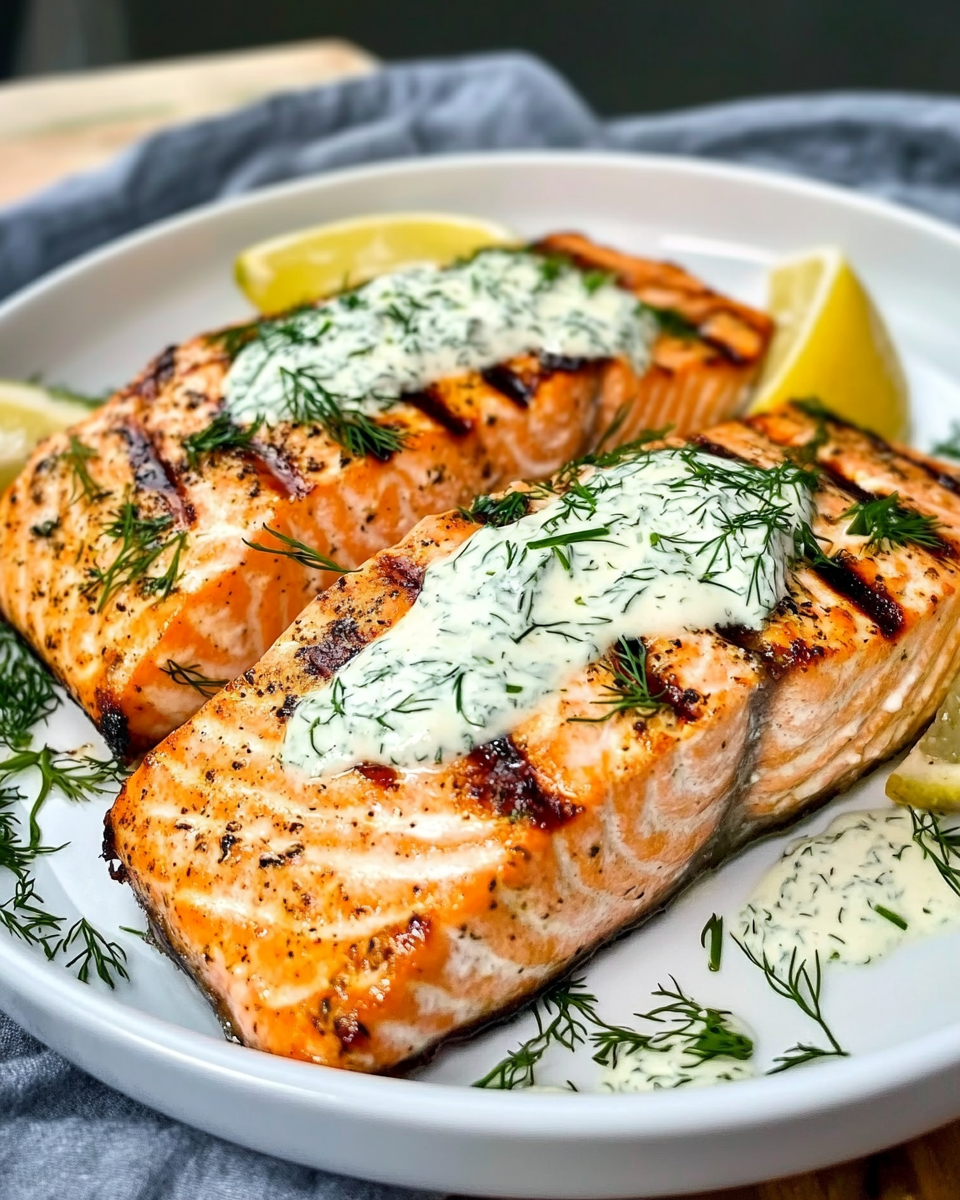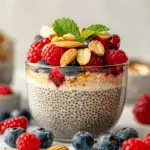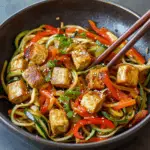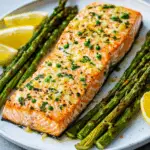A fresh and flavorful dish, this grilled salmon is paired with a creamy dill yogurt sauce for a light yet satisfying meal. Perfect for warm evenings or healthy dinner plans, the combination of herbs, lemon, and grilled fish offers a refreshing and nourishing option.
FULL RECIPE
Ingredients
- 4 salmon fillets (6 oz each)
- 1 tablespoon olive oil
- Salt, to taste
- Black pepper, to taste
- 1 cup plain Greek yogurt
- 1 tablespoon fresh dill, chopped
- 1 tablespoon lemon juice
- 1 teaspoon lemon zest
- 1 garlic clove, minced
Directions
- Preheat the grill to medium-high heat.
- Brush salmon fillets with olive oil and season with salt and pepper.
- Place the salmon on the grill, skin-side down. Grill for 4–5 minutes per side or until cooked through.
- In a small bowl, combine Greek yogurt, dill, lemon juice, lemon zest, and minced garlic. Mix well.
- Serve grilled salmon topped with the dill yogurt sauce.
Nutritional Information
- Calories: 350 per serving
- Protein: 35g
- Fat: 20g
- Carbohydrates: 4g
- Fiber:0g
- Sugar: 2g
Health Benefits of Grilled Salmon
Grilled salmon is a powerhouse of nutrition, rich in omega-3 fatty acids that support heart health and reduce inflammation. These healthy fats help lower cholesterol levels and improve brain function. The high protein content promotes muscle repair and growth while keeping you full and satisfied. Salmon is also an excellent source of vitamins B12 and D, essential for energy metabolism and bone health. The grilling method preserves these nutrients while adding a smoky flavor without extra calories.
Why Choose Grilling for Salmon
Grilling is a popular cooking method that enhances the natural flavors of salmon by caramelizing the surface, adding a subtle char that complements the fish’s richness. Unlike frying or baking, grilling allows excess fat to drip away, resulting in a lighter dish. It also cooks salmon quickly, preserving its moist texture and tender flesh. Grilling outdoors adds a social element to meals, perfect for gatherings or a relaxed family dinner.
The Role of Dill in the Sauce
Dill is a classic herb that pairs beautifully with salmon, known for its slightly tangy and fresh taste. It adds a bright, aromatic note to the creamy yogurt sauce, balancing the richness of the fish. Beyond flavor, dill contains antioxidants and compounds that support digestion and may reduce inflammation, making it a healthful addition to the dish.
Greek Yogurt as a Sauce Base
Using Greek yogurt as the base for the sauce offers a creamy texture with fewer calories and fat compared to mayonnaise or sour cream. Greek yogurt is packed with protein and probiotics, which aid gut health and boost the immune system. Its tanginess complements the lemon and dill perfectly, creating a refreshing contrast to the smoky grilled salmon.
Lemon Juice and Zest: Enhancing Flavor
Lemon juice and zest brighten the overall dish by adding acidity and citrus notes. The acid in lemon juice helps cut through the richness of the salmon and yogurt, while the zest adds a concentrated burst of flavor from the outer peel. This combination elevates the taste profile, making the dish more vibrant and appetizing.
Garlic’s Contribution to Taste and Health
Garlic adds a pungent depth of flavor to the sauce, enhancing the herbal and tangy notes. Beyond taste, garlic is known for its antimicrobial properties and potential benefits in lowering blood pressure and cholesterol. It also supports immune function, making the sauce not just delicious but nourishing.
Balancing Flavors in the Dish
This recipe masterfully balances rich, creamy, tangy, and fresh flavors. The fatty salmon contrasts with the bright and acidic lemon and the cool, herbal yogurt sauce. This balance prevents any one element from overwhelming the palate, creating a harmonious eating experience that appeals to a wide range of tastes.
Pairing Grilled Salmon with Side Dishes
Grilled salmon with dill yogurt sauce pairs well with light, fresh sides such as steamed vegetables, quinoa, or a crisp green salad. Roasted potatoes or grilled asparagus also complement the smoky flavors. For a heartier meal, serving with wild rice or couscous adds texture and substance without overpowering the main dish.
Seasonal Variations and Ingredient Swaps
Depending on the season, you can experiment with different herbs like parsley, chives, or tarragon in place of dill. Using flavored yogurt, such as cucumber or garlic-infused varieties, can add a new twist to the sauce. Lemon can be swapped for lime for a different citrus profile, and salmon can be substituted with other firm fish like trout or Arctic char.
Sustainability and Choosing Salmon
Opting for sustainably sourced salmon supports environmental conservation and ensures the fish is caught or farmed responsibly. Wild-caught Alaskan salmon is often recommended for its flavor and ecological benefits. Understanding the origins of your salmon helps promote ethical eating habits while enjoying this nutritious fish.
Storing and Reheating Grilled Salmon
Leftover grilled salmon can be stored in an airtight container in the refrigerator for up to two days. To retain moisture and flavor, gently reheat in the oven at low temperature or in a covered skillet. Avoid microwave reheating as it can dry out the fish. The yogurt sauce is best served fresh but can be refrigerated separately for up to three days.
Tips for Perfectly Grilled Salmon
To ensure even cooking, allow salmon to come to room temperature before grilling. Oil the grill grates or use a non-stick spray to prevent sticking. Avoid flipping the fish multiple times; one flip is enough to cook evenly. Using a meat thermometer helps check for doneness—salmon is ready when it reaches 145°F internally.
Cultural Influence on the Dish
Grilled salmon with herb yogurt sauce draws inspiration from Mediterranean and Scandinavian cuisines, both of which emphasize fresh herbs, citrus, and simple, healthful preparations of fish. This fusion reflects a global appreciation for clean flavors and balanced nutrition, blending culinary traditions into a versatile recipe.
Nutritional Profile Highlights
This dish is low in carbohydrates and high in protein and healthy fats, making it suitable for low-carb and ketogenic diets. It provides essential minerals like selenium and potassium, important for antioxidant defense and muscle function. The minimal use of added fat and reliance on natural ingredients make it a wholesome choice for balanced eating.
Potential Allergies and Dietary Considerations
People with dairy intolerance should note that the yogurt sauce contains dairy, though Greek yogurt tends to be lower in lactose. Those with fish allergies must avoid the salmon. The recipe is naturally gluten-free, dairy can be substituted with non-dairy yogurt options, making it adaptable for various dietary needs.
Meal Prep and Make-Ahead Ideas
The dill yogurt sauce can be prepared a day ahead to allow flavors to meld, saving time on cooking day. Salmon fillets can be marinated briefly with olive oil and lemon before grilling. For meal prep, grilled salmon can be portioned and paired with pre-cooked sides for convenient, healthy lunches or dinners throughout the week.
The Science Behind Grilling Salmon
Grilling salmon causes the Maillard reaction, where heat triggers complex flavor development on the surface of the fish, creating a delicious crust. Cooking fish quickly at high heat seals in moisture, preventing dryness. The grilling method also retains omega-3 fatty acids better than some other cooking techniques.
Presentation Tips for Serving
Serving salmon with a generous dollop of dill yogurt sauce on top or on the side allows guests to customize each bite. Garnishing with fresh dill sprigs or lemon wedges adds visual appeal. Plating on a colorful bed of greens or alongside vibrant vegetables enhances the dish’s appetizing look.
Common Mistakes to Avoid
Overcooking is the most common issue; it leads to dry, tough salmon. Be attentive to grilling times and avoid flipping too often. Another mistake is under-seasoning—salmon benefits from proper seasoning with salt and pepper before grilling. Also, using low-quality or watery yogurt can affect the sauce’s texture and flavor.
Variations for Different Palates
For a spicy twist, add a pinch of cayenne or smoked paprika to the yogurt sauce. For extra richness, mix in a small amount of crème fraîche or mayonnaise. Those who prefer less tang can reduce lemon juice or substitute with mild herbs like basil or mint for a different flavor profile.
Conclusion
Grilled salmon with dill yogurt sauce is a versatile, nutritious, and flavorful dish that appeals to many palates and dietary preferences. Its balanced combination of smoky fish, creamy and tangy sauce, and fresh herbs makes it a standout meal for casual dinners or special occasions. The recipe’s adaptability to different sides, herbs, and dietary needs ensures it can be enjoyed year-round, making it a reliable choice for anyone looking to enjoy a healthy and delicious seafood meal.






